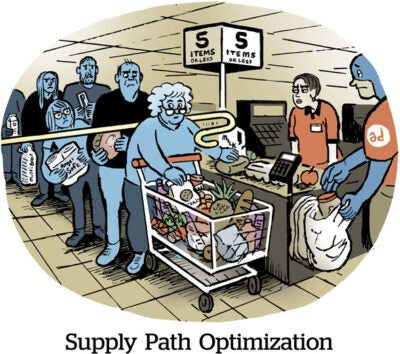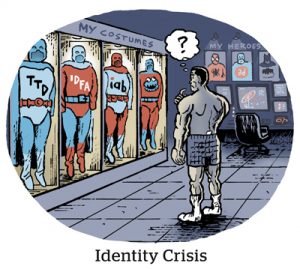As part of a plan to consolidate its SSP partners, Horizon Media struck a deal with PubMatic Monday.
By reducing the number of partners needed to facilitate a programmatic auction, there’s less opportunity for data leakage and publishers lose less revenue to the so-called “ad tech tax.” And most importantly for buyers, they spend less on more efficient ads.
The consolidation plan “will help us create a smaller decision tree so we can make faster, better auctions without as much noise,” said Jesse Fisher, SVP of programmatic and data strategy at Horizon Media.
As the buy side pursues supply-path optimization (SPO), a key SPO strategy has been to focus on working with a small number of trusted SSPs. Horizon currently works with about 10 to 15 SSPs, including PubMatic, and it’s looking to whittle that number down even more, Fisher said.
Horizon’s clients who purchase open-auction inventory through its HX trade desk will be able to use PubMatic’s SPO products to automatically optimize their bidding depending on which KPIs they want to boost, whether the deal is open auction, programmatic guaranteed or a private marketplace.
For example, PubMatic’s ROI Sync allows advertisers to do more granular optimization on publisher inventory. It compares the buyer’s historical performance data to conversion data received through a tracking pixel. Then it adjusts what the advertiser bids in real time based on the conversions driven by the publisher.
“It’s almost like a secondary bidder,” Fisher said. “[PubMatic] will look at historical performance at the publisher ID and match that up against clearing price and win rate to make sure that, if they adjust your bids, they’re not going to hurt your ability to win those impressions.”
The arrangement works for both parties, he said. “[PubMatic] sees more spend, and we see more efficiency in our buys.”
By sharing this information, “publishers see better performance, which creates long-term revenue growth – even though there might be a short-term eCPM reduction,” Fisher said. Horizon also anticipates the partnership will also facilitate direct publisher deals, he said.
The agency’s clients won’t receive priority in bidding on PubMatic’s publisher inventory, Fisher said. “You’re just getting cleaner, more transparent supply and guidance around what your minimum bid should be.”
Horizon is also making an SSP consolidation effort because it doesn’t see the need to work with so many SSP partners anymore.
In a world where it’s common for different SSPs to promise they can reach 90% to 100% of US audiences, that adds up to a lot of redundancy, Fisher said. It’s hard for the buy side to understand the value proposition of one SSP over another.
Furthermore, SSPs used to specialize in inventory types or media channels. But as advertising has evolved toward omnichannel campaigns, SSPs have deprioritized this type of specialization, Fisher said.
Better inventory packaging made PubMatic stand out for a SPO deal, Fisher said. “[PubMatic] uses supply-side signals that are available to everyone, but they use them in very smart ways to build new products, like green media auction packages and PMPs.”
Speaking of green media products, SPO solutions offer environmental benefits by reducing emissions produced during the real-time auction process. That’s an important factor for Horizon, which recently started prioritizing sustainability in its ad buying.
Horizon also expects that, by relying on PubMatic’s data products like ROI Sync and its Identity Hub ID management tool, it will become less reliant on third-party data partners, which will help it realize another SPO goal: the elimination of waste created by unnecessary links in the supply chain.
“Now, we can take those savings, that additional money we would have spent in the long tail, and we can reinvest it into a partner that we really care about, which is what we’re doing with PubMatic,” Fisher said.


















